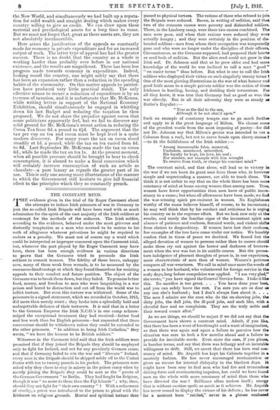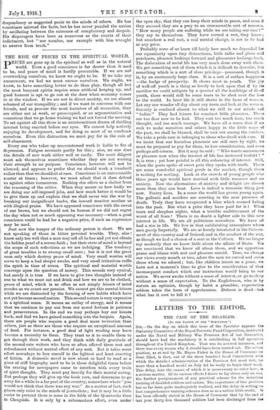THE CONSTANT MIND.
ri-1HE evidence given in the trial of Sir Roger Casement about I. the attempts to induce Irish prisoners of war in Germany to join the so-called Irish Brigade will have been read with as much admiration for the spirit of the vast majority of the Irish soldiers as contempt for the methods of the seducers. The Irish soldier, according to the evidence, behaved under the most grievous and dastardly temptation as a man who scorned to be untrue to his oath of allegiance whatever privations he might be required to endure as a penalty. We must not of course say a word which could be interpreted as improper comment upon the Casement trial, but, whatever the part played by Sir Roger Casement may have been, there has been enough evidence in various directions to prove that the Germans tried to persuade the Irish soldiers to commit treason. The fidelity of these brave, unhappy men, many of them weak from wounds, is to be measured by the enormous disadvantage at which they found themselves for resisting appeals to their comfort and future position. The object of the Germans was to break them down, but they failed. To promise better food, money, and freedom to men who were languishing in a war prison and bored to distraction and cut off from the world was to inflict torture. But even this torture was withstood. Some of the prisoners in a signed statement, which we recorded in October, 1915, did more than merely resist ; they broke into a splendidly bold and unforgettable defiance of their torturers. It is said that in a letter to the German Emperor the Irish N.C.O.'s in one camp acknow- ledged the exceptional treatment they had received—better food and less work than for English prisoners—but requested that those concessions should be withdrawn unless they could be extended to the other prisoners. "In addition to being Irish Catholics," they wrote, "we have the honour to be British soldiers."
Witnesses in the Casement trial said that the Irish soldiers were promised that if they joined the Brigade they should be employed only to fight for Ireland, and not for any peculiarly German cause, and that if Germany failed to win the war and " liberate " Ireland, every man in the Brigade should be shipped safely off to the United States with ten to twenty pounds in his pocket. The prisoners were asked why they chose to stay in misery in the prison camp when by merely joining the Brigade they could be sent as the "guests of the German Government" to Berlin. They had fought for Belgium, though it was "no more to them than the Fiji Islands " ; why, then, should they not fight for" their own country " ? With a refinement of cruelty, a priest was introduced to the prison to plead with the Irishmen on religious grounds. Mental and spiritual torture then
passed to physical torture. The rations of those who refused to join the Brigade were reduced. Bacon, in writing of sedition, said that two of the common causes were poverty and disbanded soldiers. There, in the Limburg camp, were these two causes combined. The men were poor, and when their rations were reduced they were actually hungry ; and they were certainly in the position of dis- banded soldiers—men from whom their occupation was temporarily gone and who were no longer under the discipline of their officers. Circumstances, as the Germans supposed, had prepared their hearts as seed-beds of sedition. But the alien seed could not grow in the Irish soil. Dr. Johnson said that as he grew older and had more
knowledge of the world he was inclined to call a man " good " "on easier terms" than before. But what is one to call the Irish soldiers who displayed their virtue on such singularly uneasy terms?
One of the most glowing illustrations in the war of what honour and good faith mean to a simple private soldier was the action of these Irishmen in hustling, booing, and deriding their tormentors. For
all they knew, it was true that Germany had as good as won the war already. But in all their adversity they were as steady as
Butler's Royalist :— " True as the dial to the sun, Although it be not shin'd upon."
Such an example of constancy tempts one to go much further and apply to it the great language of Milton. We choose some of the grandest words from the most imposing of poetry—for did not Dr. Johnson say that Milton's genius was intended to cut a
Colossus from a rock, but not to carve heads upon cherry-stones 1 —to fit the faithfulness of the Irish soldier :—
" Among innumerable false, unmoved, Unshaken, unseduced, unterrified, His loyalty he kept, his love, his zeal ; Nor number, nor example with him wrought To swerve from truth, or change his constant mind."
The constant mind, and that alone, will lead us to victory is
the war if we can learn its great uses from those who, in however simple and unpretending a manner, are able to teach them. We think it is not unfair to say that on the whole there has been more constancy of mind at home among women than among men. True, women have fewer opportunities than men have of public incon- stancy to a cause ; but when all allowances have been made, we find the war-winning spirit pre-eminent in women. No Englishman worthy of the name believes himself, of course, to be inconstant; he may well think that by his conduct and criticisms he is urging his country on to the supreme effort. But we look now only at the results, and surely the familiar signs of the inconstant spirit aro absence of patience and coolness, frenzied words, and violent shift* from elation to despondency. If women have lost their coolness, few examples of the loss have come under our notice. We humbly confess that in times of peace we doubted. We feared lest the alleged devotion of women to persons rather than to causes should make them cry out against the horror and darkness of bereave- ment when the war was but in its middle course. But the prema- ture indulgence of pleasant thoughts of peace is, in our experience, more characteristic of men than of women. Women's patience conquers all war-weariness. We call to mind once more the words of
a woman to her husband, who volunteered for foreign service in the early days, long before compulsion was applied. "I am very glad," she wrote, "you have signed the General Service form. I take it like
this. No sacrifice is too great. . . . You have done your best, and you can safely leave the rest. I'm sure you are as dear as any one else's husband ; but I don't always fuss about it. . . . The men I admire are the ones who do the un-showing jobs, the dirty jobs, the dull jobs, the ill-paid jobs, and such like, with a cheerful face and no complaints. They are the truly noble and their reward comes after."
As we see things, we should be unjust if we did not say that the Government have shown a constant mind. Admit, if you like, that there has been a want of forethought and a want of imagination, so that there was again and again a failure to perceive how the situation was sure to look a few months ahead and a failure to provide for inevitable needs. Even state the case, if you please, in harsher terms, and say that there was lethargy and an incurable willingness to drift. Still, we assert that there has been real con- stancy of mind. Mr. Asquith has kept his Cabinets together in a masterly fashion. He has never encouraged recrimination at given an excuse for internal disloyalty in the blackest days. IA might have been easy to find men who had fire and tremendotn driving-force and overmastering impulses, but could we have found men on the whole with more constancy of mind than those whe have directed the war ? Brilliance often 'undoes itself ; energy that is without caution spoils as much as it achieves. Mr. Asquith has never ceased to display the virtues of his defects ; he has never
for a, moment boon "rattled," never in a phrase conking/fit
despondency or suggested panic to the minds of others. He has sometimes misread the facts, but he has never puzzled the nation by oscillating between the extremes of complacency and despair. His disparagers have been as numerous as the counts of their indictment, but "nor number, nor example with him wrought to swerve from truth."











































 Previous page
Previous page